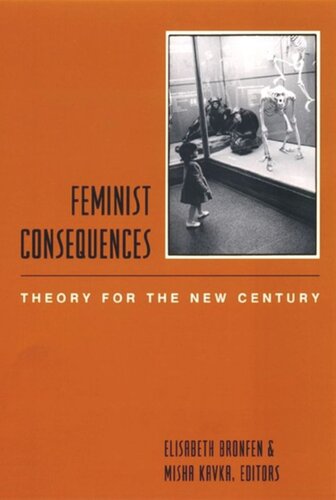

Most ebook files are in PDF format, so you can easily read them using various software such as Foxit Reader or directly on the Google Chrome browser.
Some ebook files are released by publishers in other formats such as .awz, .mobi, .epub, .fb2, etc. You may need to install specific software to read these formats on mobile/PC, such as Calibre.
Please read the tutorial at this link: https://ebookbell.com/faq
We offer FREE conversion to the popular formats you request; however, this may take some time. Therefore, right after payment, please email us, and we will try to provide the service as quickly as possible.
For some exceptional file formats or broken links (if any), please refrain from opening any disputes. Instead, email us first, and we will try to assist within a maximum of 6 hours.
EbookBell Team

4.4
12 reviewsExploring the status of feminism in this "postfeminist" age, this sophisticated meditation on feminist thinking over the past three decades moves away from the all too common dependence on French theorists and male thinkers and instead builds on a wide-ranging body of feminist theory written by women. These writings address the question "Where are we going?" as well as "Where have we come from?" As evidenced in the essays compiled here, the multiplicity of directions available to this new feminism ranges from poststructuralist academic theory through cultural activism to re-readings of law, literature, and representation.
Exploring the status of feminism in this "postfeminist" age, this sophisticated meditation on feminist thinking over the past three decades moves away from the all too common dependence on French theorists and male thinkers and instead builds on a wide-ranging body of feminist theory written by women.
These writings address the question "Where are we going?" as well as "Where have we come from?" As evidenced in the essays compiled here, the multiplicity of directions available to this new feminism ranges from poststructuralist academic theory through cultural activism to re-readings of law, literature, and representation. Contributors include Mieke Bal, Lauren Berlant, Rosi Braidotti, Elisabeth Bronfen, Judith Butler, Rey Chow, Drucilla Cornell, Ann Cvetkovich, Jane Gallop, Beatrice Hanssen, Claire Kahane, Ranjana Khanna, Biddy Martin, Juliet Mitchell, Anita Haya Patterson, and Valerie Smith.
Feminist Consequences, representing the forefront of international feminist thought, marks a new and long-desired stage of feminist criticism where women are themselves making theory rather than reacting to male production.